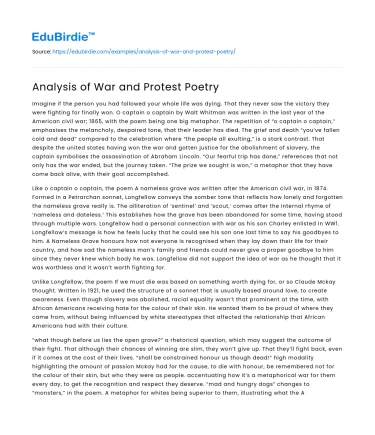Imagine if the person you had followed your whole life was dying. That they never saw the victory they were fighting for finally won. O captain o captain by Walt Whitman was written in the last year of the American civil war; 1865, with the poem being one big metaphor. The repetition of “o captain o captain,” emphasises the melancholy, despaired tone, that their leader has died. The grief and death “you’ve fallen cold and dead” compared to the celebration where “the people all exulting,” is a stark contrast. That despite the united states having won the war and gotten justice for the abolishment of slavery, the captain symbolises the assassination of Abraham Lincoln. “Our fearful trip has done,” references that not only has the war ended, but the journey taken. “The prize we sought is won,” a metaphor that they have come back alive, with their goal accomplished.
Like o captain o captain, the poem A nameless grave was written after the American civil war, in 1874. Formed in a Petrarchan sonnet, Longfellow conveys the somber tone that reflects how lonely and forgotten the nameless grave really is. The alliteration of ‘sentinel’ and ‘scout,’ comes after the internal rhyme of ‘nameless and dateless.’ This establishes how the grave has been abandoned for some time, having stood through multiple wars. Longfellow had a personal connection with war as his son Charley enlisted in WW1. Longfellow’s message is how he feels lucky that he could see his son one last time to say his goodbyes to him. A Nameless Grave honours how not everyone is recognised when they lay down their life for their country, and how sad the nameless man’s family and friends could never give a proper goodbye to him since they never knew which body he was. Longfellow did not support the idea of war as he thought that it was worthless and it wasn’t worth fighting for.
Save your time!
We can take care of your essay
- Proper editing and formatting
- Free revision, title page, and bibliography
- Flexible prices and money-back guarantee
Unlike Longfellow, the poem If we must die was based on something worth dying for, or so Claude Mckay thought. Written in 1921, he used the structure of a sonnet that is usually based around love, to create awareness. Even though slavery was abolished, racial equality wasn’t that prominent at the time, with African Americans receiving hate for the colour of their skin. He wanted them to be proud of where they came from, without being influenced by white stereotypes that affected the relationship that African Americans had with their culture.
“what though before us lies the open grave?” a rhetorical question, which may suggest the outcome of their fight. That although their chances of winning are slim, they won’t give up. That they’ll fight back, even if it comes at the cost of their lives. “shall be constrained honour us though dead!” high modality highlighting the amount of passion Mckay had for the cause, to die with honour, be remembered not for the colour of their skin, but who they were as people. accentuating how it’s a metaphorical war for them every day, to get the recognition and respect they deserve. “mad and hungry dogs” changes to “monsters,” in the poem. A metaphor for whites being superior to them, illustrating what the African Americans saw as evil victimizing helpless people, referencing the whites by dehumanising them. The contrast at the start from “like hogs” to “like men,” indicates how they are seen as animalistic but are actually brave men, ready to stand for what they believe in. The pronouns of ‘we’, ‘us’ and ‘our,’ are there to show that he isn’t the only one willing to fight back, but his whole community as well. This is seen when he calls out “O kinsmen!” Which can be interpreted as a battle cry for his brothers to unite as one.






 Stuck on your essay?
Stuck on your essay?

